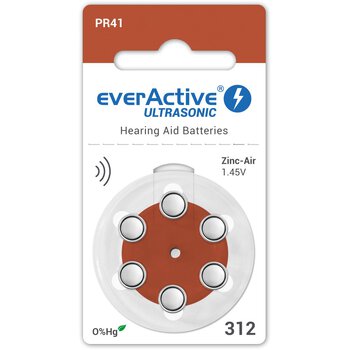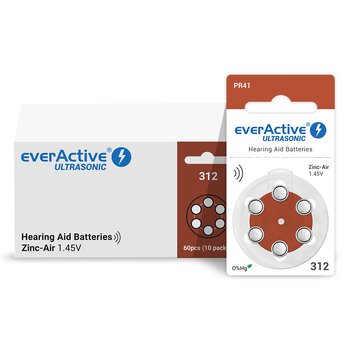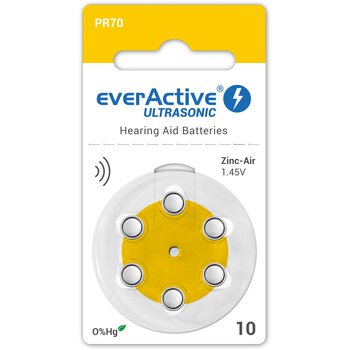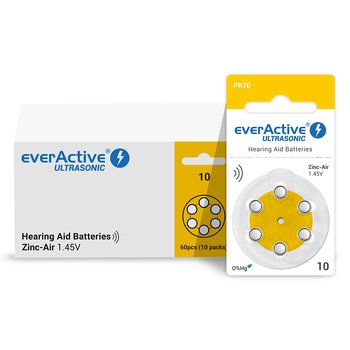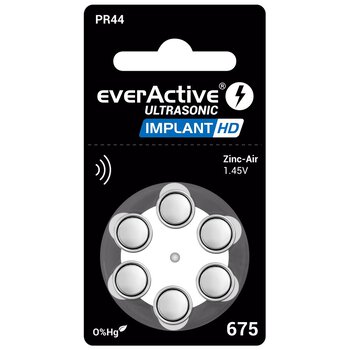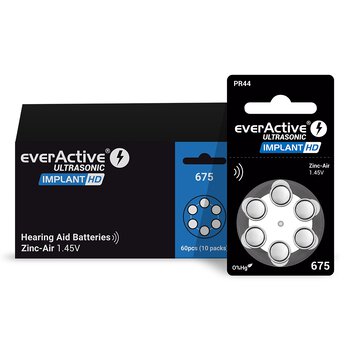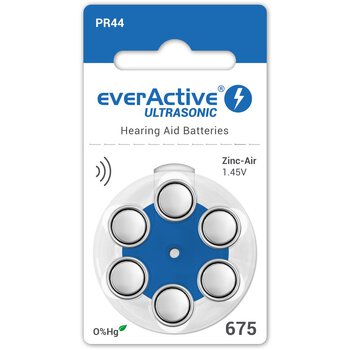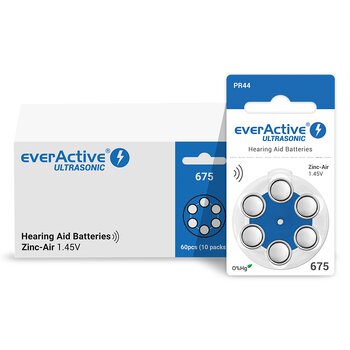- Tips
- technology
- Frequently Asked Questions
- Tests
- mAh capacity
- Rated Capacity
- comparison
- everActive
- Batteries vs rechargeable batteries
- Accumulated energy
- Durability of rechargeable batteries
- Efficiency of rechargeable batteries
- battery voltage
- LR03 AAA
- LR6 AA
- eneloop
- AG13 LR1154 LR44
- CR 2032
- Delta V
- Charge Cycles
- internal resistance
- charge level
- memory effect
- accredited test
- SR44 357
- Hearing Batteries 675
- SR626 377
- Watch Batteries
- Polarity
- Mah
- passivation
- LS 14250
- LS 14500
What factors affect the operating time of zinc-air hearing batteries?
The battery life depends primarily on the power consumption of the hearing aid itself and the amplification level you set.
The intensity of external noise is also important.
The battery life will certainly be longer if the user remembers to turn off the camera when it is not in use (e.g. during sleep).
It is also important to remember that adverse environmental conditions such as too high or low temperatures, high humidity or air pollution can have a negative impact on the performance of any zinc-air battery in your hearing aid.
Back to: List of articles about hearing aid batteries
Users of hearing aid and implant batteries often notice a change in battery life. How long the battery lasts depends primarily on the power consumption of the device. It can change in the following situations:
- Along with sound amplification, e.g. in situations where we often stay in a noisier room. The batteries will therefore wear out faster when we are in a restaurant or at concerts. Also, setting the camera volume to higher positions will drain the battery faster.
- Zinc-air batteries are sensitive to environmental conditions. A decrease in ambient temperature will shorten the battery life. This should be remembered by people, e.g. those who work outdoors in winter.
- An increase in altitude also means a decrease in the oxygen content in the air. Therefore, if you are in the mountains, your battery may last less time.
- Another aspect may be the fact that the user's hearing impairment is getting worse, resulting in the need to amplify the sound in the device.
- Even air pollution can affect the duration of your hearing battery.
Copyright ? Baltrade
Also watch the video on how to use hearing aid batteries
Popular hearing batteries in the hurt.com.pl store
30 x everActive ULTRASONIC 312 hearing batteries
Batteries 312 / PR41
- Reliable zinc-air batteries for hearing aids
- Voltage: 1.45V
- environmentally friendly batteries - mercury-free (0% Hg)
- Expiry date: min. 2029
30 x everActive ULTRASONIC 10 hearing batteries
- reliable zinc-air batteries for hearing aids
- voltage: 1.45V
- Environmentally friendly batteries - mercury-free (0% Hg)
- expiry date: min. 2029
30 x everActive ULTRASONIC 13 hearing batteries
- reliable zinc-air batteries for hearing aids
- voltage: 1.45V
- Environmentally friendly batteries - mercury-free (0% Hg)
- expiry date: min. 2029
30 x everActive ULTRASONIC IMPLANT HD 675 hearing batteries
- A rugged, high-current version of the 675 battery with enhanced performance
- dedicated to cochlear implants and speech processors
- voltage: 1.45V
- Environmentally friendly batteries - mercury-free (0% Hg)
- expiry date: min. 2029
30 x everActive ULTRASONIC 675 hearing batteries
- reliable zinc-air batteries for hearing aids
- voltage: 1.45V
- Environmentally friendly batteries - mercury-free (0% Hg)
- expiry date: min. 2029

